人教版版必修一Unit 1 Teenage life grammar课件(39张)
文档属性
| 名称 | 人教版版必修一Unit 1 Teenage life grammar课件(39张) | 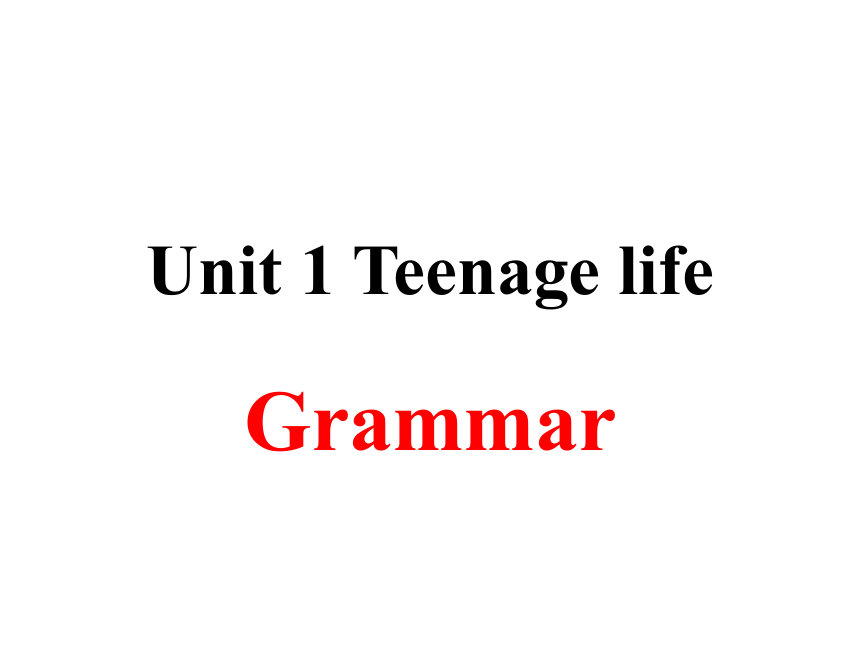 | |
| 格式 | pptx | ||
| 文件大小 | 154.5KB | ||
| 资源类型 | 教案 | ||
| 版本资源 | 人教版(2019) | ||
| 科目 | 英语 | ||
| 更新时间 | 2021-01-12 16:21:22 | ||
图片预览

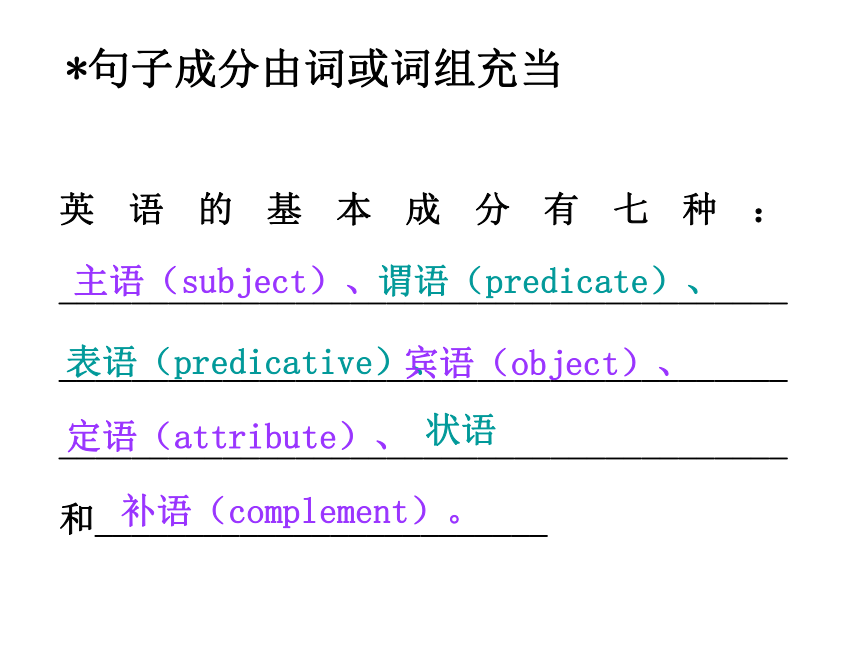
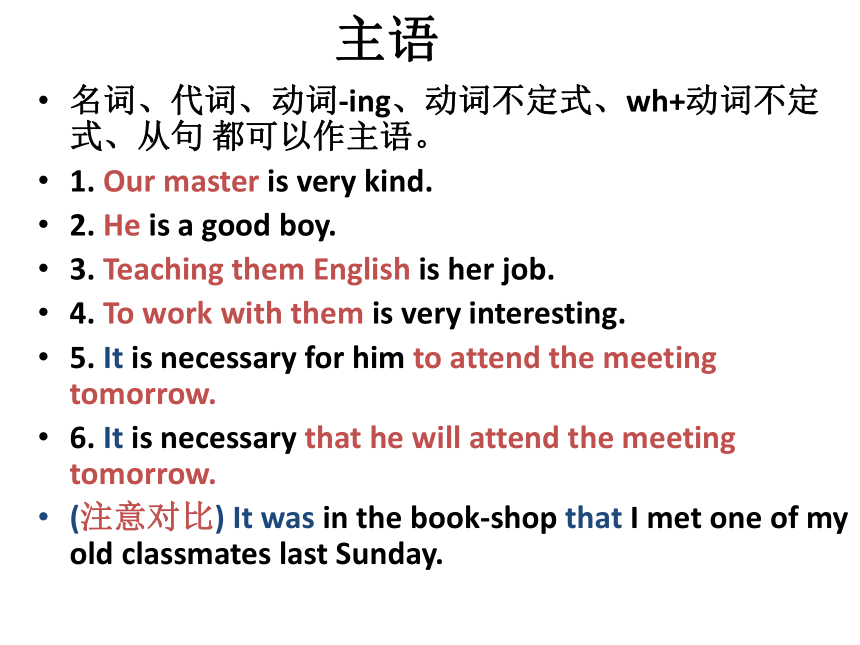
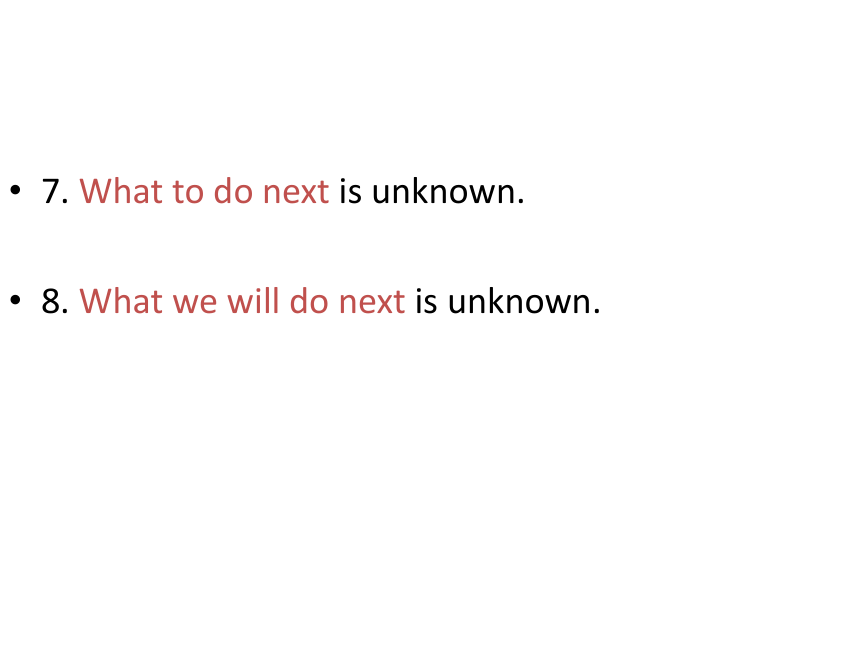
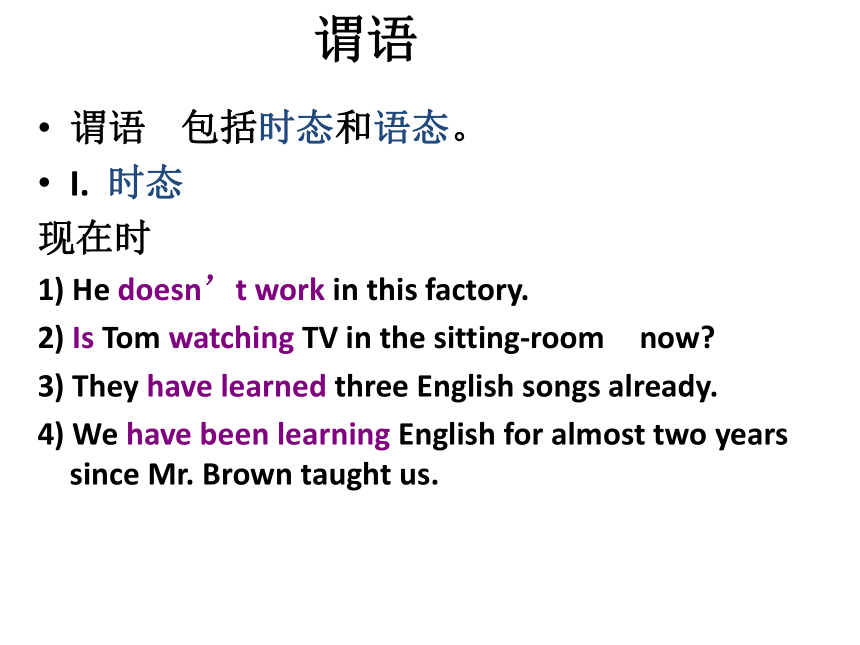
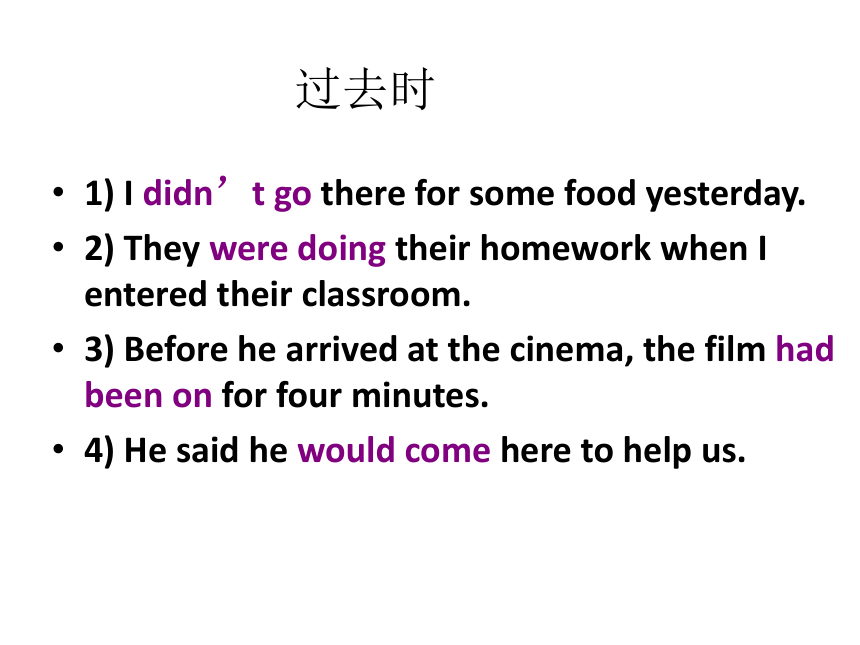
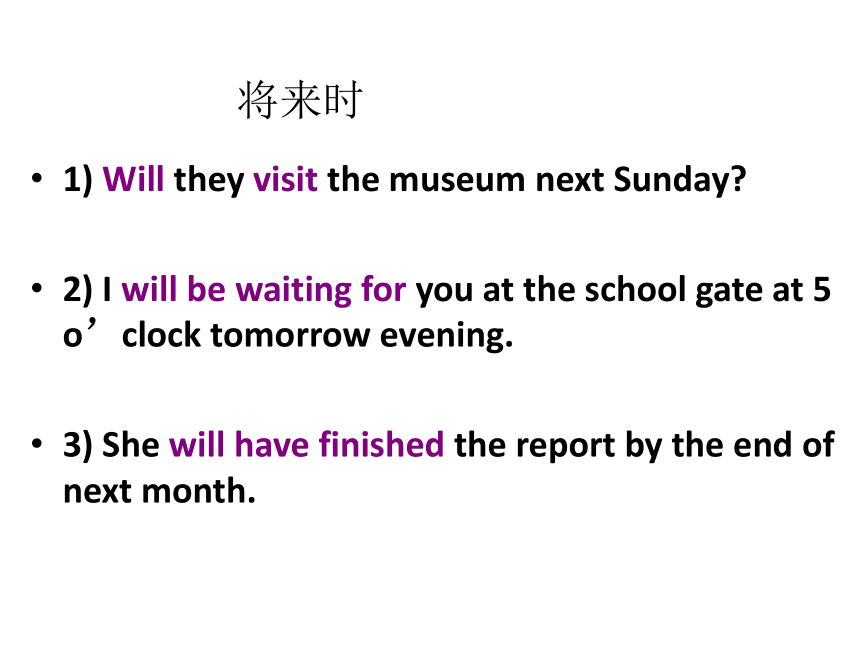
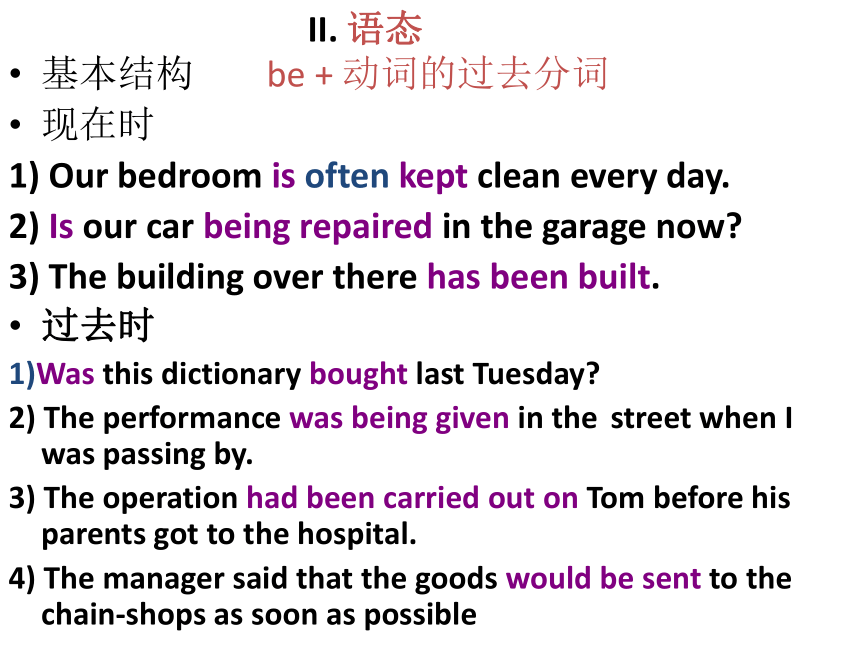
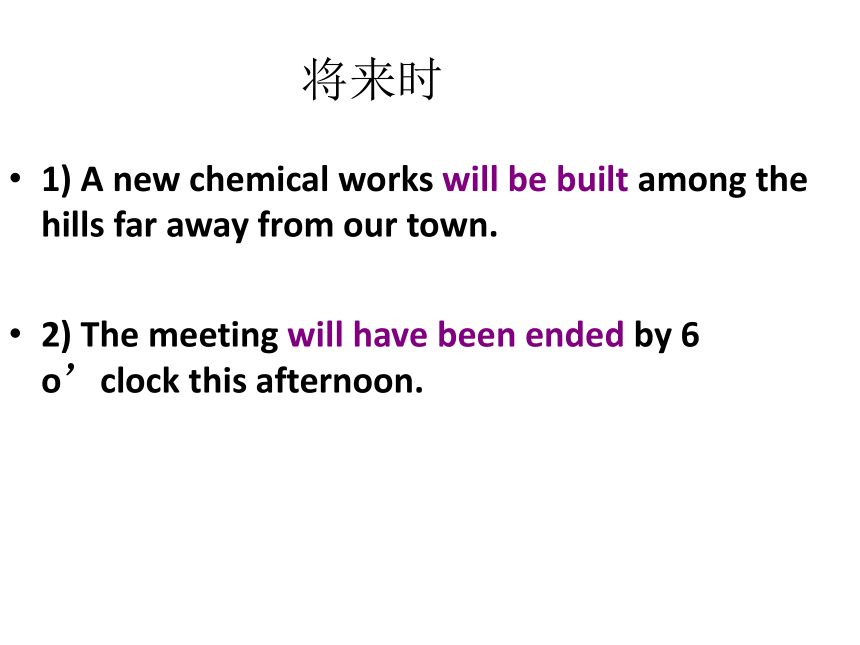
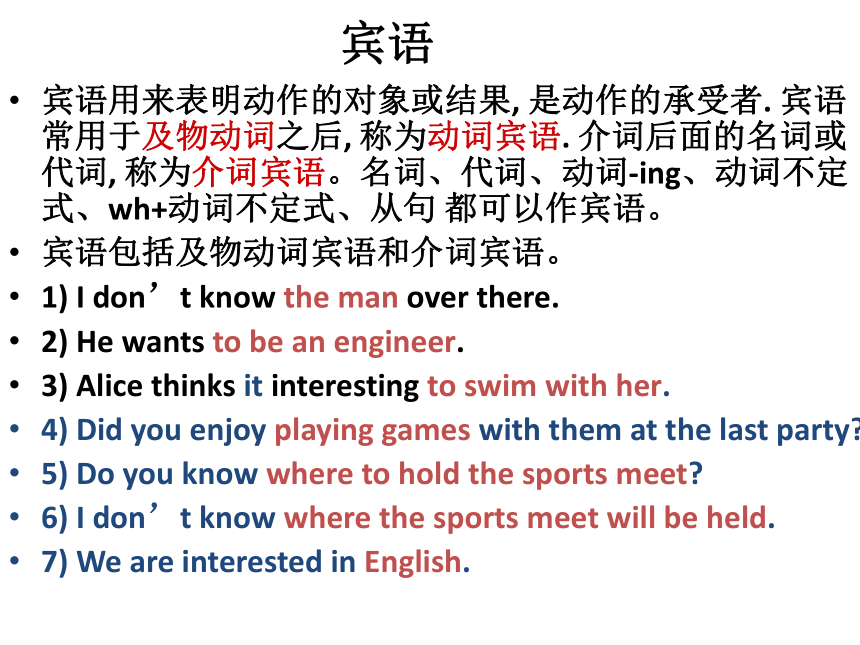
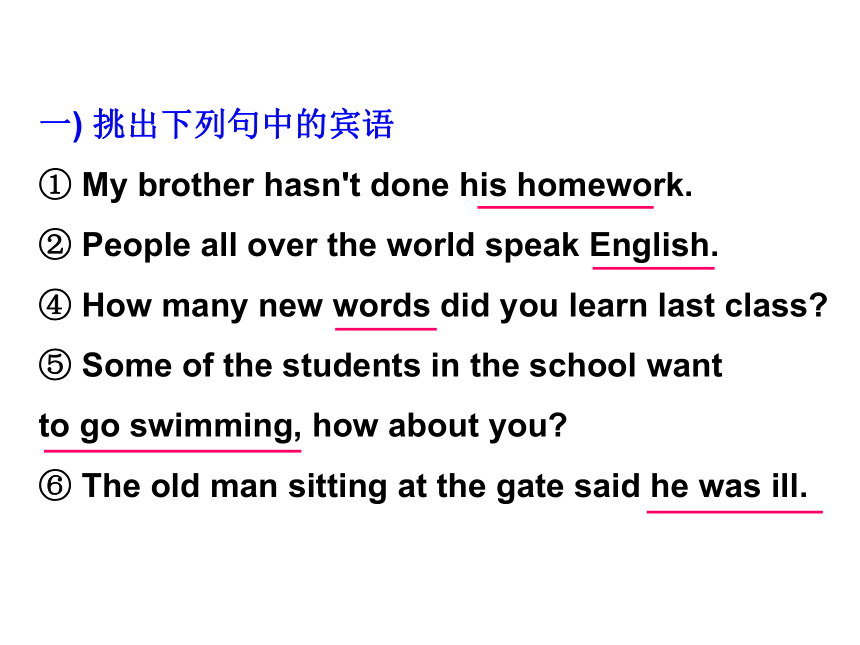
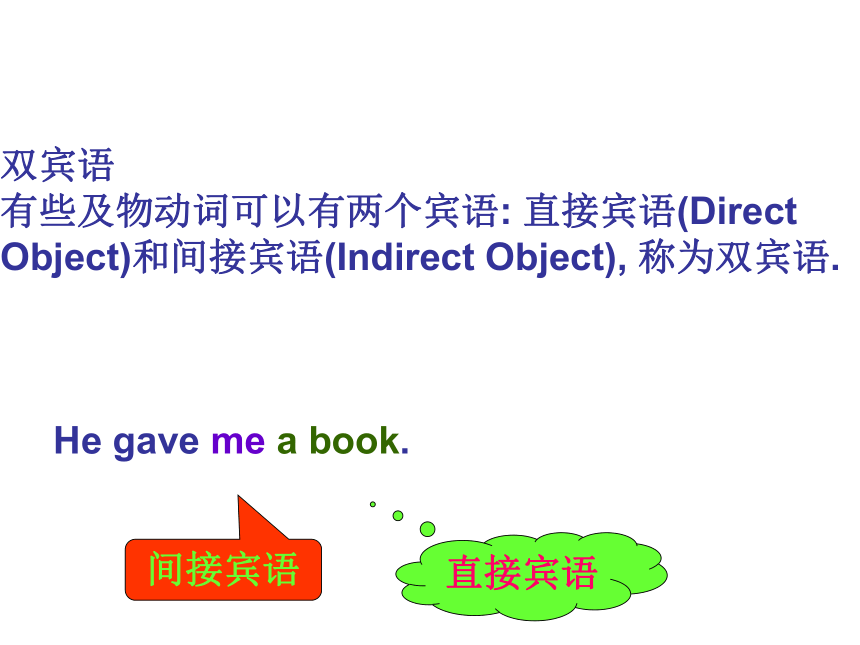
文档简介
Unit 1 Teenage life
Grammar
*句子成分由词或词组充当
英语的基本成分有七种:________________________________________________________________________________________________________________________和_________________________
主语(subject)、
谓语(predicate)、
表语(predicative)、
宾语(object)、
定语(attribute)、
状语
补语(complement)。
主语
名词、代词、动词-ing、动词不定式、wh+动词不定式、从句 都可以作主语。
1. Our master is very kind.
2. He is a good boy.
3. Teaching them English is her job.
4. To work with them is very interesting.
5. It is necessary for him to attend the meeting tomorrow.
6. It is necessary that he will attend the meeting tomorrow.
(注意对比) It was in the book-shop that I met one of my old classmates last Sunday.
7. What to do next is unknown.
8. What we will do next is unknown.
谓语
谓语 包括时态和语态。
I. 时态
现在时
1) He doesn’t work in this factory.
2) Is Tom watching TV in the sitting-room now?
3) They have learned three English songs already.
4) We have been learning English for almost two years since Mr. Brown taught us.
过去时
1) I didn’t go there for some food yesterday.
2) They were doing their homework when I entered their classroom.
3) Before he arrived at the cinema, the film had been on for four minutes.
4) He said he would come here to help us.
将来时
1) Will they visit the museum next Sunday?
2) I will be waiting for you at the school gate at 5 o’clock tomorrow evening.
3) She will have finished the report by the end of next month.
II. 语态
基本结构 be + 动词的过去分词
现在时
1) Our bedroom is often kept clean every day.
2) Is our car being repaired in the garage now?
3) The building over there has been built.
过去时
1)Was this dictionary bought last Tuesday?
2) The performance was being given in the street when I was passing by.
3) The operation had been carried out on Tom before his parents got to the hospital.
4) The manager said that the goods would be sent to the chain-shops as soon as possible
将来时
1) A new chemical works will be built among the hills far away from our town.
2) The meeting will have been ended by 6 o’clock this afternoon.
宾语
宾语用来表明动作的对象或结果, 是动作的承受者. 宾语常用于及物动词之后, 称为动词宾语. 介词后面的名词或代词, 称为介词宾语。名词、代词、动词-ing、动词不定式、wh+动词不定式、从句 都可以作宾语。
宾语包括及物动词宾语和介词宾语。
1) I don’t know the man over there.
2) He wants to be an engineer.
3) Alice thinks it interesting to swim with her.
4) Did you enjoy playing games with them at the last party?
5) Do you know where to hold the sports meet?
6) I don’t know where the sports meet will be held.
7) We are interested in English.
一) 挑出下列句中的宾语
① My brother hasn't done his homework.
② People all over the world speak English.
④ How many new words did you learn last class?
⑤ Some of the students in the school want
to go swimming, how about you?
⑥ The old man sitting at the gate said he was ill.
双宾语
有些及物动词可以有两个宾语: 直接宾语(Direct Object)和间接宾语(Indirect Object), 称为双宾语.
He gave me a book.
间接宾语
直接宾语
表语
表语是用来说明主语的性质,身份,特征和状态。表语须和连系动词一起构成句子的复合谓语。表语一般放在连系动词之后。表语可以由名词,形容词或起名词和形容词作用的词和短语担任。
1) He isn’t a teacher.
2) John is quite tall.
3) Are they in ?
4) His full-time job is selling newspapers.
5) The cup is broken.
6) He was to leave when the phone rang.
8) The question is when and where we will go for a picnic.
9) The children are in the reading-room now.
句子谓语动词都不能表达一个完整的意思,必须加上一个表明主语身份或状态的表语,才能表达完整的意思。这类动词叫做连系动词。连系动词分别有:be, look, feel, smell, taste, sound,get, grow, become, turn, go等。be 本身没有什么意义,只起连系主语和表语的作用。
系动词
一?be动词类:?am、?is?、are?、was?、were?
二?表示变化类:become、?get?、?turn?、?grow?、go?
三?感官动词类:?look? sound smell taste feel appear, seem
四?表示延续性的动词?:remain?、stay?、keep?
He is a student
His face turned red
The apple tastes sweet
The soldier keeps still.
(二) 挑出下列句中的表语
-- The old man was feeling very tired.
-- The leaves have turned yellow.
-- Soon They all became interested in the subject.
补足语
补足语 在英语中有些及物动词,接了宾语意义仍不完整,还需要有一个其他的句子成分,来补充说明宾语的意义、状态等,称为宾语补足语,简称宾补。
可分为主语补足语和宾语补足语
名词、形容词、表示方向地点的副词、动词-ing、动词的过去分词、动词不定式、介词短语等都可以作补足语
1) We all made Jack monitor at the last class meeting.
2) Did you find our room very dirty?
3) Let him in, please.
4) Someone found him swimming in the river when it was getting dark.
5) I heard him sing three pop songs in the next room last night.
6) I asked him to give her his uncle’s phone number.
We found it difficult to solve this problem.
形式宾语
宾语补足语
真正宾语
I think it necessary that we should vote on it.
形式宾语
宾语补足语
真正宾语
注意:在let, make, watch, see, hear, feel等词后, 接动词不定式作宾补, 则须省去不定式符号to.
We heard him sing in the next room.
可接形容词作宾补的动词有:make, get, keep, find, feel, leave, think, set, drive等。
(四) 挑出下列句中的宾语补足语
① She likes the children to read newspapers and books in the reading-room.
② He asked her to take the boy out of school.
③ She found it difficult to do the work.
④ They call me Lily sometimes.
⑤ I saw Mr Wang get on the bus.
定语
定语用来限定、修饰名词或代词,是对名词或代词起修饰、限定作用的词、短语或句子,汉语中常用‘……的’表示。
定语可分为:前置定语和后置定语。
1) The tall boy is Tom’s elder brother.
2) The dancing hall is being repaired now.
3) The broken cup isn’t mine.
4) The sleeping girl is my younger sister.
5) Something strange has happened.
6) Do you know the man in the picture?
7) She is the only women to attend the meeting.
8) No one knows the cause of the accident.
9)The man who is coming toward us is my father
(三) 挑出下列句中的定语
1. What is your given name?
2. I am afraid some people forgot to sweep the floor.
3. The man downstairs was trying to sleep.
4. I am waiting for the sound of the other shoe!
状语
用来修饰动词、形容词、副词或整个句子, 说明地点
时间、原因、目的、结果、条件、让步、方向、程度、方
式或伴随情况的句子成分, 被称为状语(Adverbial). 可充
当状语的有:
a. 副词 Who can write beautifully? Please come here.
b. 介词短语
We’re going to spend the holiday at the seaside.
c. 动词不定式短语
His mother often comes to see him.
d. 分词
He came in, smiling. / Going eastward, you’ll moutains and thousands of lakes.
f. 从句
As soon as the teacher came in, all the students stood up.
状语种类如下
?How about meeting again at six?(时间状语)
?Last night she didn’t go to the dance party because of the rain.(原因状语)
?I shall go there if it doesn’t rain.(条件状语)
?Mr Smith lives on the third floor.(地点状语)
?She put the eggs into the basket with great care.(方式状语)
?She came in with a dictionary in her hand.(伴随状语)
?In order to catch up with the others, I must work harder.(目的状语)
?He was so tired that he fell asleep immediately.(结果状语)
?She works very hard though she is old.(让步状语)
?I am taller than he is.(比较状语)
(五) 挑出下列句中的状语
① There was a big smile on her face.
② Every night he heard the noise upstairs.
③ He began to learn English when he was eleven.
④ The man on the motorbike was traveling too fast.
⑤ With the medicine box under her arm, Miss Li hurried off.
⑥ She loves the library because she loves books.
⑦ I am afraid that if you've lost it, you must pay for it.
⑧ The students followed Uncle Wang to see the other machine.
同位语
在句子中, 一个名词或代词, 或相当于名词的短语或从
句, 放在另一个名词或代词之后, 用以说明它的性质或情
况, 被称为同位语(Appositive). 可作同位语的通常有:
a. 名词
This is my best friend, Tom.
b. 代词
We all got a surprise.
c. 数词
This prize is for you two.
d. 从句
I had no idea that you were here.
划分句子成分
You will tell your friend that you’ve got to school.
But as the moon gave far too much light, I didn’t dare open a window.
3. Another time five months ago, I happened to be upstairs at dusk when the window was open.
4. The dark, rainy evening, the wind, the thundering clouds held me entirely in their power.
1.You will tell (your) friend that you’ve got to school.
2. But [as the moon gave far too much light], I didn’t
dare open a window.
3. [Another time five months ago], I happened to be
Upstairs [at dusk] (when the window was open).
主语
谓语
间宾
定语
直接宾语
原因状语
主语
谓语
宾语
4. The (dark, rainy) evening, the wind, the
thundering Clouds held me [entirely] in their power.
主语
主语
主语
谓语
宾语
独立成分
有时句子中会有一些与句子没有语法联系的成分,称为句子独立成分
感叹词:oh,hello,aha,ah,等。
肯定词yes
否定词no
称呼语:mum, dad。
插入语:一些句中插入的 I think , I believe,等。
如: The story, I think, has never come to the end
情态词,表示说话人的语气(多作为修饰全句的状语):perhaps也许,maybe大概,actually实际上,certainly当然,等。
简单句、并列句和复合句
(一)句子种类两种分类法
1、按句子的用途可分四种:
1)陈述句(肯定、否定):He is six years old; She didn’t hear of you before.
2)疑问句(一般、特殊、选择、反意):Do they like skating? How old is he? Is he six or seven years old? Mary can swim, can’t she?
3)祈使句:Be careful, boys; Don’t talk in class
4)感叹句:How clever the boy is!
2、按句子的结构可分三种:
1)简单句:只有一个主语(或并列主语)和一个谓语(或并列谓语)。
e.g. He often reads English in the morning.
?Tom and Mike are American boys.
?She likes drawing and often draws pictures for the wall newspapers.
2) 并列句:由并列连词(and, but, or等)或分号(;)把两个或两个以上的简单句连在一起构成。
e.g. You help him and he helps you.
? He wants to go there but I don’t
hurry up, or you will be late.
This house belongs to Mr.Smith;it costs millions of dollars.
3)复合句:含有一个或一个以上从句的句子。复合句包含:名词性从句、定语从句和状语从句等。
e.g. The foreign visitors took a lot of pictures when they were at the Great Wall
This is the book that I want.
I think that he is right.
简单句的五种基本句型
1主语+不及物动词:( S V)
We work.
She came.
My head aches.?
The bell rang.
2主语+系动词+表语(SVC)
系动词
一?be动词类:?am、?is?、are?、was?、were?
二?表示变化类:become、?get?、?turn?、?grow?、go?
三?感官动词类:?look? sound smell taste feel appear, seem
四?表示延续性的动词?:remain?、stay?、keep?
He is a student
His face turned red
The apple tastes sweet
The soldier keeps still.
3主语+及物动词+宾语(SVO)
e.g. Henry bought a dictionary.
Mike ate three cakes
she drew a beautiful picture.
4、主语+及物动词+双宾语(间接宾语+直接宾语)(SVIOO)(SVOiO)
e.g. My father bought me a car.
------My father bought a car for me
He gave me three yuan.
------He gave three yuan to me
5、主语+及物动词+复合宾语(宾语+宾补)(SVOC)
Tom made the baby laugh.
We made him our monitor.
I can’t make myself understood.
We want to have the desk repaired.
Grammar
*句子成分由词或词组充当
英语的基本成分有七种:________________________________________________________________________________________________________________________和_________________________
主语(subject)、
谓语(predicate)、
表语(predicative)、
宾语(object)、
定语(attribute)、
状语
补语(complement)。
主语
名词、代词、动词-ing、动词不定式、wh+动词不定式、从句 都可以作主语。
1. Our master is very kind.
2. He is a good boy.
3. Teaching them English is her job.
4. To work with them is very interesting.
5. It is necessary for him to attend the meeting tomorrow.
6. It is necessary that he will attend the meeting tomorrow.
(注意对比) It was in the book-shop that I met one of my old classmates last Sunday.
7. What to do next is unknown.
8. What we will do next is unknown.
谓语
谓语 包括时态和语态。
I. 时态
现在时
1) He doesn’t work in this factory.
2) Is Tom watching TV in the sitting-room now?
3) They have learned three English songs already.
4) We have been learning English for almost two years since Mr. Brown taught us.
过去时
1) I didn’t go there for some food yesterday.
2) They were doing their homework when I entered their classroom.
3) Before he arrived at the cinema, the film had been on for four minutes.
4) He said he would come here to help us.
将来时
1) Will they visit the museum next Sunday?
2) I will be waiting for you at the school gate at 5 o’clock tomorrow evening.
3) She will have finished the report by the end of next month.
II. 语态
基本结构 be + 动词的过去分词
现在时
1) Our bedroom is often kept clean every day.
2) Is our car being repaired in the garage now?
3) The building over there has been built.
过去时
1)Was this dictionary bought last Tuesday?
2) The performance was being given in the street when I was passing by.
3) The operation had been carried out on Tom before his parents got to the hospital.
4) The manager said that the goods would be sent to the chain-shops as soon as possible
将来时
1) A new chemical works will be built among the hills far away from our town.
2) The meeting will have been ended by 6 o’clock this afternoon.
宾语
宾语用来表明动作的对象或结果, 是动作的承受者. 宾语常用于及物动词之后, 称为动词宾语. 介词后面的名词或代词, 称为介词宾语。名词、代词、动词-ing、动词不定式、wh+动词不定式、从句 都可以作宾语。
宾语包括及物动词宾语和介词宾语。
1) I don’t know the man over there.
2) He wants to be an engineer.
3) Alice thinks it interesting to swim with her.
4) Did you enjoy playing games with them at the last party?
5) Do you know where to hold the sports meet?
6) I don’t know where the sports meet will be held.
7) We are interested in English.
一) 挑出下列句中的宾语
① My brother hasn't done his homework.
② People all over the world speak English.
④ How many new words did you learn last class?
⑤ Some of the students in the school want
to go swimming, how about you?
⑥ The old man sitting at the gate said he was ill.
双宾语
有些及物动词可以有两个宾语: 直接宾语(Direct Object)和间接宾语(Indirect Object), 称为双宾语.
He gave me a book.
间接宾语
直接宾语
表语
表语是用来说明主语的性质,身份,特征和状态。表语须和连系动词一起构成句子的复合谓语。表语一般放在连系动词之后。表语可以由名词,形容词或起名词和形容词作用的词和短语担任。
1) He isn’t a teacher.
2) John is quite tall.
3) Are they in ?
4) His full-time job is selling newspapers.
5) The cup is broken.
6) He was to leave when the phone rang.
8) The question is when and where we will go for a picnic.
9) The children are in the reading-room now.
句子谓语动词都不能表达一个完整的意思,必须加上一个表明主语身份或状态的表语,才能表达完整的意思。这类动词叫做连系动词。连系动词分别有:be, look, feel, smell, taste, sound,get, grow, become, turn, go等。be 本身没有什么意义,只起连系主语和表语的作用。
系动词
一?be动词类:?am、?is?、are?、was?、were?
二?表示变化类:become、?get?、?turn?、?grow?、go?
三?感官动词类:?look? sound smell taste feel appear, seem
四?表示延续性的动词?:remain?、stay?、keep?
He is a student
His face turned red
The apple tastes sweet
The soldier keeps still.
(二) 挑出下列句中的表语
-- The old man was feeling very tired.
-- The leaves have turned yellow.
-- Soon They all became interested in the subject.
补足语
补足语 在英语中有些及物动词,接了宾语意义仍不完整,还需要有一个其他的句子成分,来补充说明宾语的意义、状态等,称为宾语补足语,简称宾补。
可分为主语补足语和宾语补足语
名词、形容词、表示方向地点的副词、动词-ing、动词的过去分词、动词不定式、介词短语等都可以作补足语
1) We all made Jack monitor at the last class meeting.
2) Did you find our room very dirty?
3) Let him in, please.
4) Someone found him swimming in the river when it was getting dark.
5) I heard him sing three pop songs in the next room last night.
6) I asked him to give her his uncle’s phone number.
We found it difficult to solve this problem.
形式宾语
宾语补足语
真正宾语
I think it necessary that we should vote on it.
形式宾语
宾语补足语
真正宾语
注意:在let, make, watch, see, hear, feel等词后, 接动词不定式作宾补, 则须省去不定式符号to.
We heard him sing in the next room.
可接形容词作宾补的动词有:make, get, keep, find, feel, leave, think, set, drive等。
(四) 挑出下列句中的宾语补足语
① She likes the children to read newspapers and books in the reading-room.
② He asked her to take the boy out of school.
③ She found it difficult to do the work.
④ They call me Lily sometimes.
⑤ I saw Mr Wang get on the bus.
定语
定语用来限定、修饰名词或代词,是对名词或代词起修饰、限定作用的词、短语或句子,汉语中常用‘……的’表示。
定语可分为:前置定语和后置定语。
1) The tall boy is Tom’s elder brother.
2) The dancing hall is being repaired now.
3) The broken cup isn’t mine.
4) The sleeping girl is my younger sister.
5) Something strange has happened.
6) Do you know the man in the picture?
7) She is the only women to attend the meeting.
8) No one knows the cause of the accident.
9)The man who is coming toward us is my father
(三) 挑出下列句中的定语
1. What is your given name?
2. I am afraid some people forgot to sweep the floor.
3. The man downstairs was trying to sleep.
4. I am waiting for the sound of the other shoe!
状语
用来修饰动词、形容词、副词或整个句子, 说明地点
时间、原因、目的、结果、条件、让步、方向、程度、方
式或伴随情况的句子成分, 被称为状语(Adverbial). 可充
当状语的有:
a. 副词 Who can write beautifully? Please come here.
b. 介词短语
We’re going to spend the holiday at the seaside.
c. 动词不定式短语
His mother often comes to see him.
d. 分词
He came in, smiling. / Going eastward, you’ll moutains and thousands of lakes.
f. 从句
As soon as the teacher came in, all the students stood up.
状语种类如下
?How about meeting again at six?(时间状语)
?Last night she didn’t go to the dance party because of the rain.(原因状语)
?I shall go there if it doesn’t rain.(条件状语)
?Mr Smith lives on the third floor.(地点状语)
?She put the eggs into the basket with great care.(方式状语)
?She came in with a dictionary in her hand.(伴随状语)
?In order to catch up with the others, I must work harder.(目的状语)
?He was so tired that he fell asleep immediately.(结果状语)
?She works very hard though she is old.(让步状语)
?I am taller than he is.(比较状语)
(五) 挑出下列句中的状语
① There was a big smile on her face.
② Every night he heard the noise upstairs.
③ He began to learn English when he was eleven.
④ The man on the motorbike was traveling too fast.
⑤ With the medicine box under her arm, Miss Li hurried off.
⑥ She loves the library because she loves books.
⑦ I am afraid that if you've lost it, you must pay for it.
⑧ The students followed Uncle Wang to see the other machine.
同位语
在句子中, 一个名词或代词, 或相当于名词的短语或从
句, 放在另一个名词或代词之后, 用以说明它的性质或情
况, 被称为同位语(Appositive). 可作同位语的通常有:
a. 名词
This is my best friend, Tom.
b. 代词
We all got a surprise.
c. 数词
This prize is for you two.
d. 从句
I had no idea that you were here.
划分句子成分
You will tell your friend that you’ve got to school.
But as the moon gave far too much light, I didn’t dare open a window.
3. Another time five months ago, I happened to be upstairs at dusk when the window was open.
4. The dark, rainy evening, the wind, the thundering clouds held me entirely in their power.
1.You will tell (your) friend that you’ve got to school.
2. But [as the moon gave far too much light], I didn’t
dare open a window.
3. [Another time five months ago], I happened to be
Upstairs [at dusk] (when the window was open).
主语
谓语
间宾
定语
直接宾语
原因状语
主语
谓语
宾语
4. The (dark, rainy) evening, the wind, the
thundering Clouds held me [entirely] in their power.
主语
主语
主语
谓语
宾语
独立成分
有时句子中会有一些与句子没有语法联系的成分,称为句子独立成分
感叹词:oh,hello,aha,ah,等。
肯定词yes
否定词no
称呼语:mum, dad。
插入语:一些句中插入的 I think , I believe,等。
如: The story, I think, has never come to the end
情态词,表示说话人的语气(多作为修饰全句的状语):perhaps也许,maybe大概,actually实际上,certainly当然,等。
简单句、并列句和复合句
(一)句子种类两种分类法
1、按句子的用途可分四种:
1)陈述句(肯定、否定):He is six years old; She didn’t hear of you before.
2)疑问句(一般、特殊、选择、反意):Do they like skating? How old is he? Is he six or seven years old? Mary can swim, can’t she?
3)祈使句:Be careful, boys; Don’t talk in class
4)感叹句:How clever the boy is!
2、按句子的结构可分三种:
1)简单句:只有一个主语(或并列主语)和一个谓语(或并列谓语)。
e.g. He often reads English in the morning.
?Tom and Mike are American boys.
?She likes drawing and often draws pictures for the wall newspapers.
2) 并列句:由并列连词(and, but, or等)或分号(;)把两个或两个以上的简单句连在一起构成。
e.g. You help him and he helps you.
? He wants to go there but I don’t
hurry up, or you will be late.
This house belongs to Mr.Smith;it costs millions of dollars.
3)复合句:含有一个或一个以上从句的句子。复合句包含:名词性从句、定语从句和状语从句等。
e.g. The foreign visitors took a lot of pictures when they were at the Great Wall
This is the book that I want.
I think that he is right.
简单句的五种基本句型
1主语+不及物动词:( S V)
We work.
She came.
My head aches.?
The bell rang.
2主语+系动词+表语(SVC)
系动词
一?be动词类:?am、?is?、are?、was?、were?
二?表示变化类:become、?get?、?turn?、?grow?、go?
三?感官动词类:?look? sound smell taste feel appear, seem
四?表示延续性的动词?:remain?、stay?、keep?
He is a student
His face turned red
The apple tastes sweet
The soldier keeps still.
3主语+及物动词+宾语(SVO)
e.g. Henry bought a dictionary.
Mike ate three cakes
she drew a beautiful picture.
4、主语+及物动词+双宾语(间接宾语+直接宾语)(SVIOO)(SVOiO)
e.g. My father bought me a car.
------My father bought a car for me
He gave me three yuan.
------He gave three yuan to me
5、主语+及物动词+复合宾语(宾语+宾补)(SVOC)
Tom made the baby laugh.
We made him our monitor.
I can’t make myself understood.
We want to have the desk repaired.
